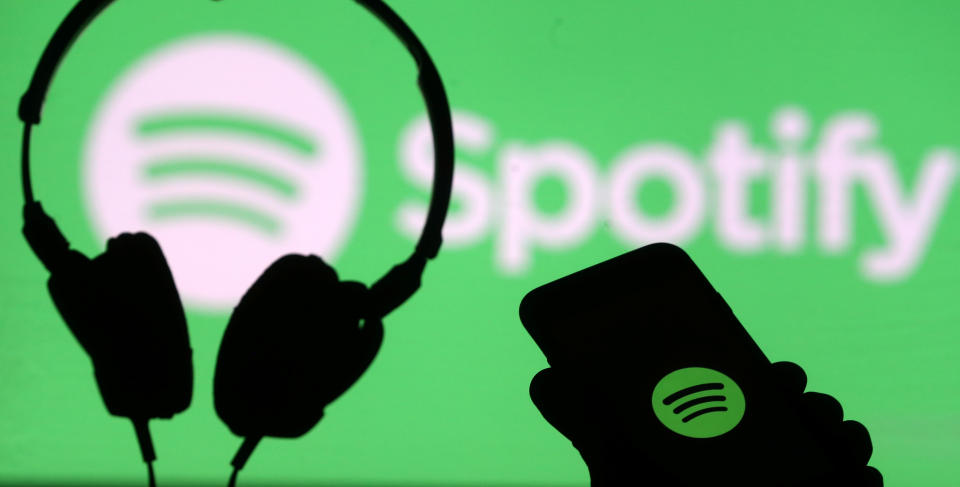Streaming boom becomes 'holy grail' for resurgent music industry
After years of erosion, music sales are on the rebound — thanks in large part to a massive boost from worldwide streaming.
Once shunned by a number of high-profile artists, digital music is starting to pay dividends to big-name acts and smaller artists alike, experts say. One reason is that old industry standards have been streamlined for the digital era, ensuring that musicians are more fairly compensated for their music.
The other is the white-hot streaming industry, which has led consumers to pay for music via subscriptions. BuzzAngle Music, a firm that tracks industry performance, found that on-demand audio streaming soared 41.8% in 2018, topping 534 billion streams.
Yet as the industry reverses a decline in sales, questions remain about how much more impact streaming will have on the industry.
There’s a lot at stake — especially as juggernauts like Spotify (SPOT), Apple Music (AAPL), Amazon Music (AMZN) and YouTube (GOOG) significantly boost market share in an industry once dominated by AM-FM radio and large record stores.
According to Ben Swinburne, a managing director of research at Morgan Stanley (MS), it’s all about global growth and converting consumers from free platforms to paid.
“It’s a growth industry, and we expect that growth to be driven by 20% growth in subscription streaming revenue. That’s really the driver,” Swinburne told Yahoo Finance in a recent interview.
“The streaming companies are global companies concerned with global growth,” he added.
Over the last several years, consumers have increasingly opened their wallets on recorded music, which as a category saw revenues surge by 12% last year to over $9 billion, according to Recording Industry Association of America (RIAA) data.
The driver behind that surge were paid streaming subscriptions, the RIAA noted.
“Growth of streaming services is amazing, subscription streaming is very positive for us,” Richard James Burgess, the CEO of the American Association of Independent Music (A2IM), told Yahoo Finance recently.
A2IM helped champion the legislation that updated copyright laws, which are now more lucrative for independent artists.
“In general, there’s very high optimism right now,” Burgess said on the sidelines of the Libera Awards, a celebration of independent music that was the culminating event of A2IM’s Indie Week.

‘Right song at the right time’
Streaming services look like a good investment if they can continue to innovate and drive music discovery, which is another way in which they’ve remade the business. A significantly larger catalog of music is now available for music consumption in a way that it never has been before.
“Music discovery is the holy grail for any music business. How do you as a distributor, and for that matter as an artist, find the right listener and deliver the right song at the right time?” asked Morgan Stanley’s Swinburne.
“In a world of 40 million tracks, it’s overwhelming to try to navigate that,” he said. “For a lot of people, they don’t have time to figure out who’s cool and what’s hot.”
That’s why services like Spotify’s “Discover Weekly” playlist, which curates songs from artists based on users’ listening habits, have allowed many more artists to find their way to having their music heard.
“Some of the things that technology brought really decimated the industry, and really was responsible for a lot of the drop-off, said Michael Huppe, president and CEO of SoundExchange, the premier digital performance rights organization in the world.
Now, “that technology is part of the recovery,” Huppe added.
While the business used to be built around a model in which labels were just attempting to drive sales of records, listening itself has become increasingly important, he added.
It’s “the whole kahuna,” Huppe said.
Artists vs. Streamers

Although streaming has revitalized much of the business side of the industry, it is the artists and their innovation who continue to make this growth possible.
For some artists, the path to accepting streaming has been hard-fought, with most objections having to do with money.
Taylor Swift famously withheld her “1989” album from Apple Music until it agreed to pay royalties to artists. Meanwhile, the late Prince was notorious about blocking his music from major platforms, an effort which prevailed until after his death.
Streaming services have actively attempted to improve their reputation among artists and songwriters, but there are still strains. Recently, most of the major streaming platforms legally objected to royalty raises for songwriters, which were agreed upon by the U.S. Copyright Royalty Board in January of 2018.
“Everyone knows that the [streaming] services could pay more money, at least from the music industry’s perspective,” said Joe Conyers III, the Co-Founder and Chief Strategy Officer of Songtrust, the largest music publishing administrator in the world.
“We’re just trying to make it equitable, fairer, truthful, and more transparent. Bring some trust back into the music industry,” he added.
Streaming services are forced to walk a difficult line between their bottom lines, and maintaining positive relationships with the artists that undergird the success of their platforms.
Still, simple math may open up new strains between streaming companies and the music industry. Technology has made it cheaper for consumers to enjoy music, but it’s also shrunken elements of the business.
In 2000, music was a $14 billion business (or $20 billion adjusted for inflation). Today, the industry sits at $10 billion.
Meanwhile, a report from Swinburne showed that in 2000, U.S. consumers spent $8 per month on music. Now, they spend $4.
“I think there’s a path back to and beyond the revenue in 2000,” said Huppe, who said that streaming isn’t going anywhere.
“There’s an immense amount of wealth being created by these services. The question is, how do we get a fair part of it to come down to the people who underpin the music,” he added.
Calder McHugh is an Associate Editor at Yahoo Finance. Follow him on Twitter:@Calder_McHugh.
The jobs report is even worse than it looks in these six sectors
These US industries could take the heaviest hit from new tariffs
Facebook denies report that Mark Zuckerberg knew of privacy issues before Cambridge scandal
US recovery closes in on 10 year milestone as fears abound that the party is ending
Uber said to be expanding into fintech, boosting NYC hiring
Follow Yahoo Finance on Twitter, Facebook, Instagram, Flipboard, SmartNews, LinkedIn, YouTube, and reddit.
